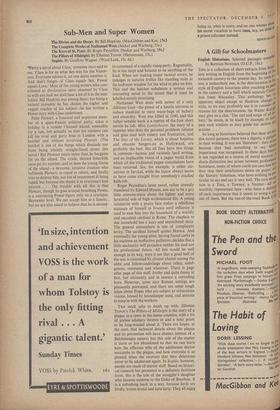Sub-Men and Super Women
'WRITE a novel about Class,' someone once said to me. 'Class is for us what Sex was for the Victor- ians. Everyone adores it, no one dares mention it. And don't forget—if Class equals Sex, Power equals Love.' Most of the young writers who con- tributed to Declaration seem obsessed by 'Class so with any luck we shall hear a lot of it in the near future. Bill Hopkins was among them; but being a natural romantic he has chosen the higher and vaguer reaches of the subject—he has written. a Power story with Class undertones.
Peter Plowart, a fanatical and important mem- ber of a quasi-Fascist political party, takes a holiday in a remote Channel Island, ostensibly for a rest, but actually so that his minions can kill his rival and party boss in London with a hatchet and without involving Plowart. (The hatchet is one of the things which dissuade one from being wholely straight-faced about this novel.) But Plowart meets more than he bargains for on the island. The crude, shrewd fisherfolk soon get his number, and so does the young Dame of the island—a tiresome, intuitive creature who befriends. Plowart, is raped in return, and finally tries to destroy him, not out of resentment at being raped, but because she thinks it in everyone's best interest. . . . The trouble with all this is that Plowart, though he goes around breathing Power, is a convincing Power-figure only on a crackpot, Bayswater level. We can accept him as a fanatic; but we are also asked to believe that he is second-
in-command of a rapidly rising party. Regrettably, he is too inept and fatuous to be anything of the kind. When not making major tactical errors, he indulges in naturist frolics like standing nude at his bedroom window for the wind to play on him. This and the hatchet unbalance a serious and interesting novel to the extent that it must be labelled merely promising.
Nathanael West deals with power of a very different kind—the power of a hostile universe to reduce mankind to mere waste-bags of lechery and absurdity. West was killed in 1940, and this rather notable book is a reprint of the four short novels he left. Miss Lonelyhearts, the story of a reporter who does the personal problems column and goes mad with misery and frustration, and The Day of the Locust, which is about hopeless and obscene hangers-on in Hollywood, are probably the best. But all four have two things in common—laconic and viciously hard writing, and an implacable vision of a pagan world from which all the traditional pagan consolations have been removed. Sex, for example, is either dis- astrous or farcical, while the liquor always seems to have come straight from somebody's cracked bath-tub.
Roger Peyrefitte's latest novel, rather uneasily translated by Edward Hyams, sets out to be a gay little costume-piece about the lighter and more lavatorial side of high ecclesiastical life. A young seminarist with a pretty face makes a rebellious nuisance of himself in France until influence is used to ease him into the household of a worldly and succulent cardinal in Rome. The chaplain to this household has a juicy and uninhibited niece. The general atmosphere is one of complacent levity. The cardinal himself quotes Horace. And eventually the young abbe, having found corks in his mattress an ineffective palliative, decides that a little unchastity will prejudice neither his soul nor his professional future. All this would be well enough in its way, were it not that a good half of the text is consumed by cloister-chatter among the abbe and fellow-underlings about relics, indul- gences, vestments and whatever. There is page after page of this stuff, frothy and quite funny at first, but ultimately and in essence a corroding bore. However, some nice Roman settings are pleasantly portrayed, and there are some tough jokes about Popes who are subject to miraculous visions, bossed by housekeeper nuns, and anxious to keep in with the workers.
Two stock, jobs to finish up with. Elleston Trevor's The pillars of Midnight is the story of a plague in a town in the home counties, with a bit of joyless adultery thrown in and a nosy priest to be long-winded about it. There are hopes, at the start, that technical details about the plague and its prevention will have distinct interest of a Balchinesque nature; but this side of the matter is more or less abandoned so that we can learn how the officious wife of the adulterous doctor succumbs to the plague, and how everyone is so pleased when she recovers that they determine never to be adulterous again. In Sophie, however, people are made of sterner stuff. Based on histori- cal research but presented in a definitely fictitious form, this is the tale of the smuggler's daughter who became mistress to the Duke of Bourbon. It is a refreshing book in a way, because lords are lordly, brutes brutal and tarts tarty. They all enjoy being so, what is more, and no one whines about his secret vocation to have been, say, an artist or a prison reformer instead. SIMON 50'8














































 Previous page
Previous page